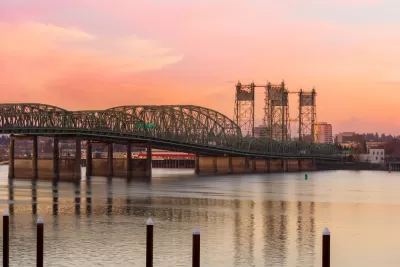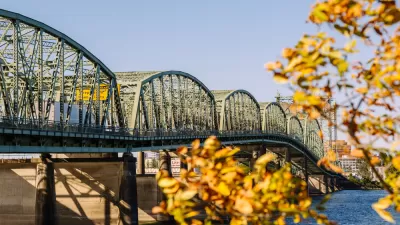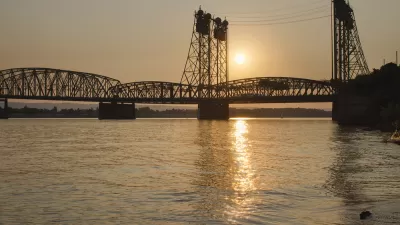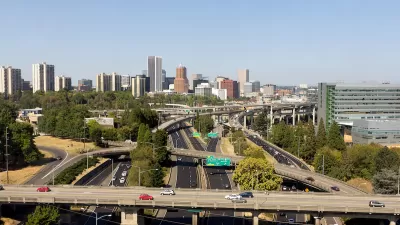2021 will be a big year for planning on the Interstate Bridge Replacement project, née Columbia River Crossing, that will connect Washington and Oregon across the Columbia River.

Officials from the states of Washington and Oregon are dusting off ambitions to replace an Interstate 5 bridge across the Columbia River. A previous version of the plan, known as the Columbia River Crossing, was killed in 2014, but not before both states spent $190 million over a decade of work on the project.
Planetizen has used the "back from the dead" hook in the headline for this article on more than once occasion regarding this project, first as officials began to re-examine and re-advocate for the project in early 2017. Oregon took a substantive step toward rejuvenating the project in August 2019. The project was on the fast track by September 2019.
The story in 2020 is told by Ryan Packer, who first details the rare collection of opposition forces that killed the project in 2015 and lists the key features of the Columbia River Crossing project of the previous decade, which would have spent $3.4 billion to increase the freeway's capacity from six to ten lanes and add seven "optimized" interchanges on either side of the river.
The project now has a new name, the Interstate Bridge Replacement (IBR) program, but it's cost estimates are still based on the old project, reports Packer, so there are still numerous questions about whether the project will expand the freeway, where, and by how much. Packer's deep reporting offers insight from leading officials about which way the project might be headed in this new iteration.
Packer notes that the question of whether the states will have to pay $140 million back to the federal government is motivating some of the action on the project, positioning 2021 as a key year for observers to monitor the project.
FULL STORY: Columbia River Crossing Freeway Project Is Back

Planetizen Federal Action Tracker
A weekly monitor of how Trump’s orders and actions are impacting planners and planning in America.

San Francisco's School District Spent $105M To Build Affordable Housing for Teachers — And That's Just the Beginning
SFUSD joins a growing list of school districts using their land holdings to address housing affordability challenges faced by their own employees.

The Tiny, Adorable $7,000 Car Turning Japan Onto EVs
The single seat Mibot charges from a regular plug as quickly as an iPad, and is about half the price of an average EV.

Seattle's Plan for Adopting Driverless Cars
Equity, safety, accessibility and affordability are front of mind as the city prepares for robotaxis and other autonomous vehicles.

As Trump Phases Out FEMA, Is It Time to Flee the Floodplains?
With less federal funding available for disaster relief efforts, the need to relocate at-risk communities is more urgent than ever.

With Protected Lanes, 460% More People Commute by Bike
For those needing more ammo, more data proving what we already knew is here.
Urban Design for Planners 1: Software Tools
This six-course series explores essential urban design concepts using open source software and equips planners with the tools they need to participate fully in the urban design process.
Planning for Universal Design
Learn the tools for implementing Universal Design in planning regulations.
Smith Gee Studio
City of Charlotte
City of Camden Redevelopment Agency
City of Astoria
Transportation Research & Education Center (TREC) at Portland State University
US High Speed Rail Association
City of Camden Redevelopment Agency
Municipality of Princeton (NJ)





























